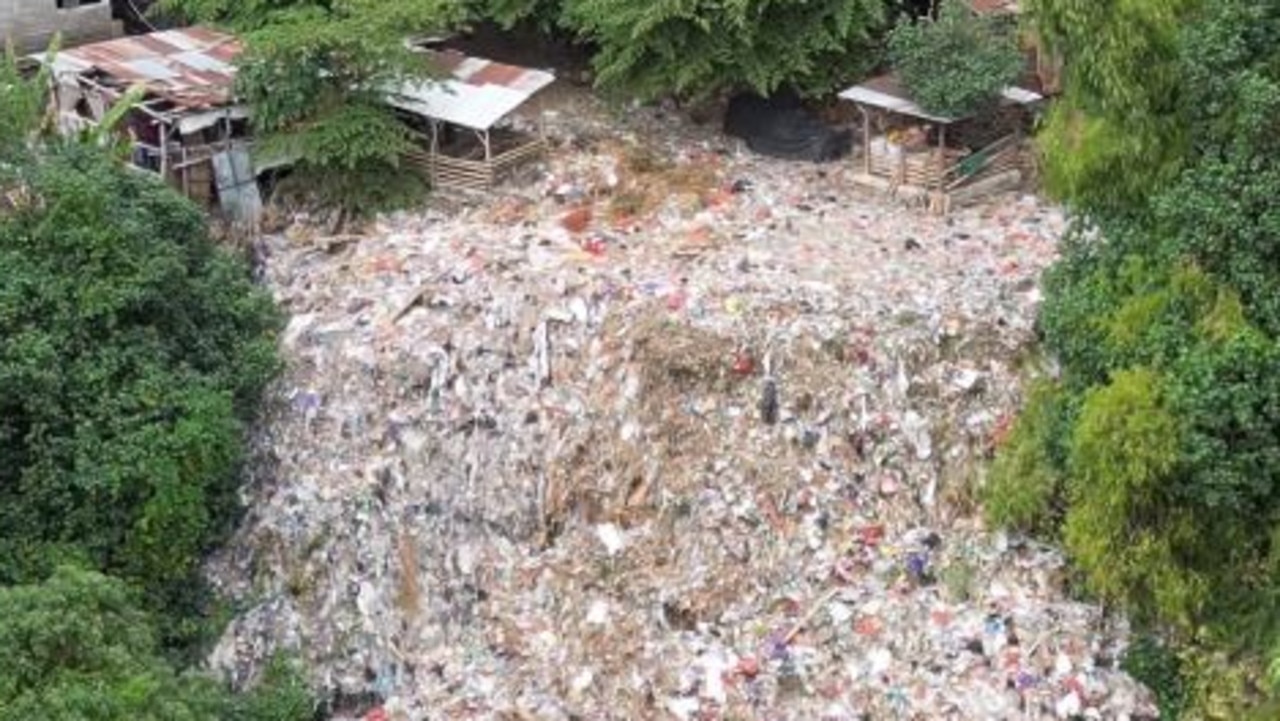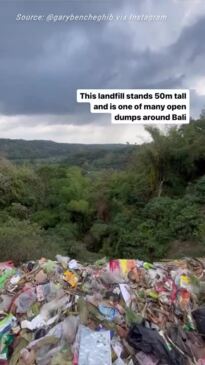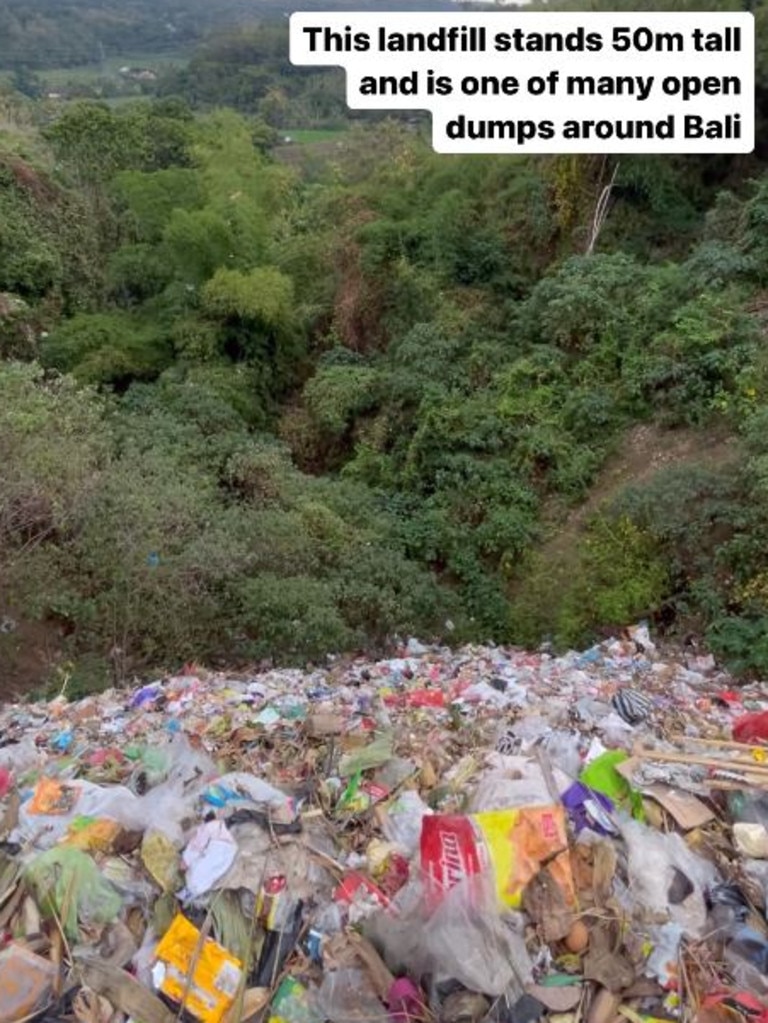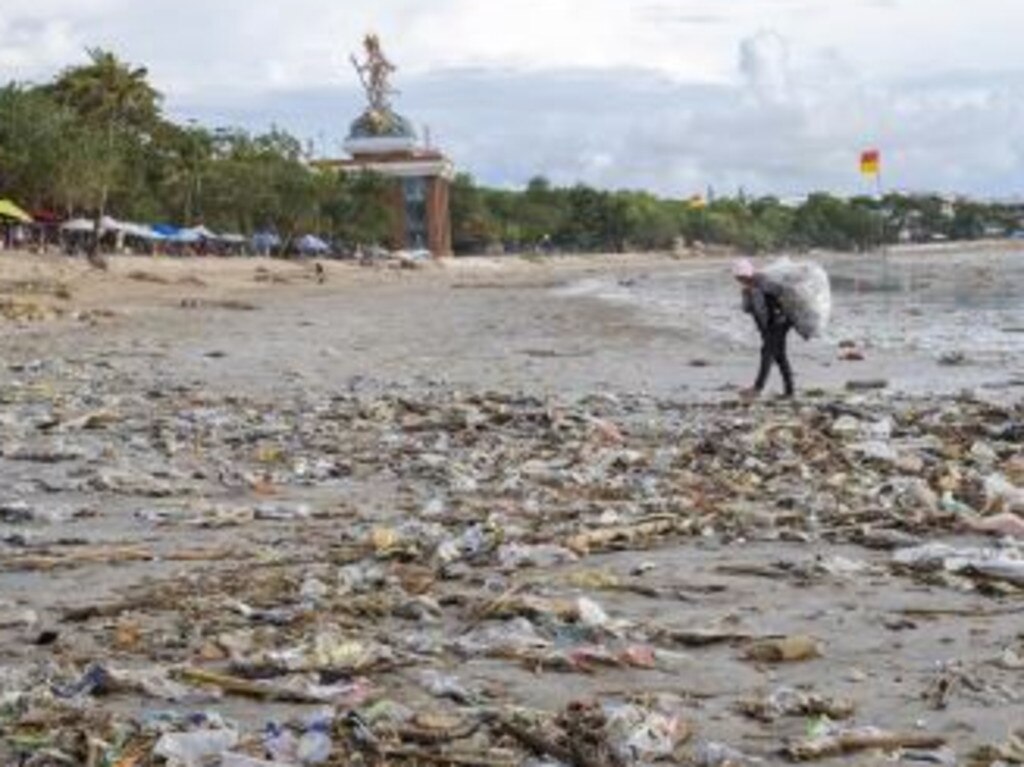‘Depressing’: Grim side of Bali exposed
Bali is known for its pristine beaches – but a viral video has exposed the sad reality of the island, leaving many in disbelief.

Bali has a waste problem and if it’s not addressed it will become “uncontrollable”, an Indonesian official has warned.
The issue of waste management in Bali has long been a hot topic, with recent photos of Kuta beach — a tourist island located in the south — showing it overrun with mounds of plastic bottles, food containers and abandoned shopping bags.
Throughout the months of October to March during Indonesia’s wet season, you will find rubbish often dumped on Bali’s Kuta, Seminyak, Legian and Jimbaran beaches daily.
It’s an annual phenomenon that sees plastic, garbage, and waste from shipping vessels often carried into land by strong winds, high tides, and driving rains.
And now there’s talks to use the recently introduced tourist tax revenue on managing the waste problem.

In July, Bali Governor Wayan Koster confirmed as of next year tourists will need to pay 150,000 Indonesian rupiah (about $15) to enter the popular island.
He said the funds would be used for “the environment, culture and [to] build better quality infrastructure”.
Indonesia’s co-ordinating minister for Maritime Affairs and Investment, Luhut Binsar Pandjaitan, suggested to have the money spent on addressing Bali’s waste problem.
He explained that if it continues without “significant and rapid improvement” the problem will become “uncontrollable”, The Bali Sun reported.


“I think it [tourism tax] is good for Bali; why not use it to look after its waste,” he told reporters last week after signing a new conservation agreement at the Bali Turtle Special Economic Zone.
“Garbage must be cleaned; now there is a smell. I spoke to the mayor of Denpasar to fix it but don’t use it as a political issue, it’s not good just fix it and reduce the smell.”
Gary Bencheghib, a French filmmaker living in Indonesia, shared a now viral Instagram video of an “open dump” 50 metres high covered in trash.

He said it is one of many open dumps around Bali.
“I’ve just made it here, right at the foot of this giant open landfill. It’s so high we can’t even see the top and it falls right into the river,” he said.
Gary’s post has attracted hundreds of comments from shocked users who described the state of the site as “depressing”.
“Myï¸ [heart] brakes by seeing this … such a beautiful country! They need education and see this. How can I help???” one person asked
“Totally heartbreaking,” said another.
A third wrote: “As we love Bali so much, things like this need to be addressed also by the local community and local government hand-in-hand.”


Gary, who is part of a dedicated team called ‘Sungai Watch’ designed to “protects waterways in Indonesia”, shared another confronting video of the waste problem.
“Over the past three days, Bali has been soaking under torrential rains,” he said.
“As a consequence, our trash barriers have been struggling to keep up, with heaps of trash piling up. But fear not, we’re taking on the challenge with unwavering determination! Despite the challenging conditions of high water flow and massive volumes, we’re diving into an emergency clean-up to safeguard against floods and protect our precious trash barriers.”
Since establishing the not-for-profit organisation in October 2020, Sungai Watch, comprised of a team of 83 full-time members have collected a total of 868,582kg of waste, according to its 2022 Impact Report.

“We have installed 75 new trash barriers this year and we expanded our operation outside of Bali into Banyuwangi in East Java,” the report read.
However, while there are volunteer groups such as Gary’s in place doing their part to protect the island, government support is still needed.
“We audited 235,218 individual waste items in 2022. Our objective with this data is to identify the sources if plastic pollution and drive meaningful conversations to ignite long-term impact with the government and the companies most responsible for the plastic pollution in Indonesia.”
In 2021, the Bali Partnership Waste Map was also established.
It’s a first of its kind dedicated to sharing how, why and wherethis is happening.
The tool — supported by the Norwegian Ministry of Foreign Affairs — allows users to visualise the origin and fate of Bali’s waste.
The ultimate goal of the initiative is to support the Bali governor’s aim to lead Indonesia’s efforts to reduce ocean plastic levels 70 per cent by 2025.
Speaking specifically to the waste issue on Kuta beach, the head of Kuta Beach Task Force, I Wayan Sirna said to overcome the problem they usually co-ordinate with the relevant agencies to clean the waste immediately.
“Because per day, the amount of waste can reach 8 trucks to 10 trucks,” he said in October last year following another onslaught of trash.
Bali briefly received some relief from its plastic plague during Covid when visitor numbers plummeted from 5.5 million to just 100,000 a year.
Now with tourism back at record levels, experts say the island’s waste systems are struggling to cope.
For example, Bali’s water runs through 400 rivers, flowing towards the ocean.
Yet, in 2020 alone, 33,000 tonnes of plastic waste travelled down these waterways into rivers and into the ocean, polluting Bali’s fragile marine ecosystems, according to the Bali Partnership Platform.
For perspective, 33,000 tonnes annually is 90 tonnes per day – the weight of 13 African elephants per day.
As such, Mr Pandjaitan wants to see revenue from the tourist tax, expected to be introduced in 2024, spent on managing the waste issue.
“I think if it (retribution fees) is good for Bali why not use it to look after its waste,” he told reporters last week.


He also pinpointed the stench coming from the Kesiman Kertalangu Integrated Waste Treatment Site in Denpasar, which has become such a problem it prompted locals to erect billboards on the backlog of trash to be processed.
Meanwhile, pictures showing Legian beach drowning under waste also went viral earlier this year.
Aussie tourist Tracey Hull shared the images on Facebook saying it was “awful” to see the beach in that state.
“That was my third time visiting Bali,” she told news.com.au at the time. “It (the rubbish) happens every time, in December it was full of plastic cups and straws and bags, all Indonesian brands.”
Authorities turned to loaders to help clear the mess, while others were tasked with raking the rubbish-strewn sand by hand.
Largely to blame for the issue are nearby landfill sites, 7News reported, with some of the region’s largest dumping grounds just 25 minutes away by boat.
“With these heavy monsoon rains it’s inevitable that a lot of that landfill rubbish, including an immense amount of plastics, will be washed into the ocean and will head straight for Bali,” Indonesia Institute founder Ross Taylor told the publication.
Indonesia is among the worst contributors to plastic pollution, with 200,000 tonnes of plastic washing into the ocean, according to a study published by the journal Nature Communications in 2017.






